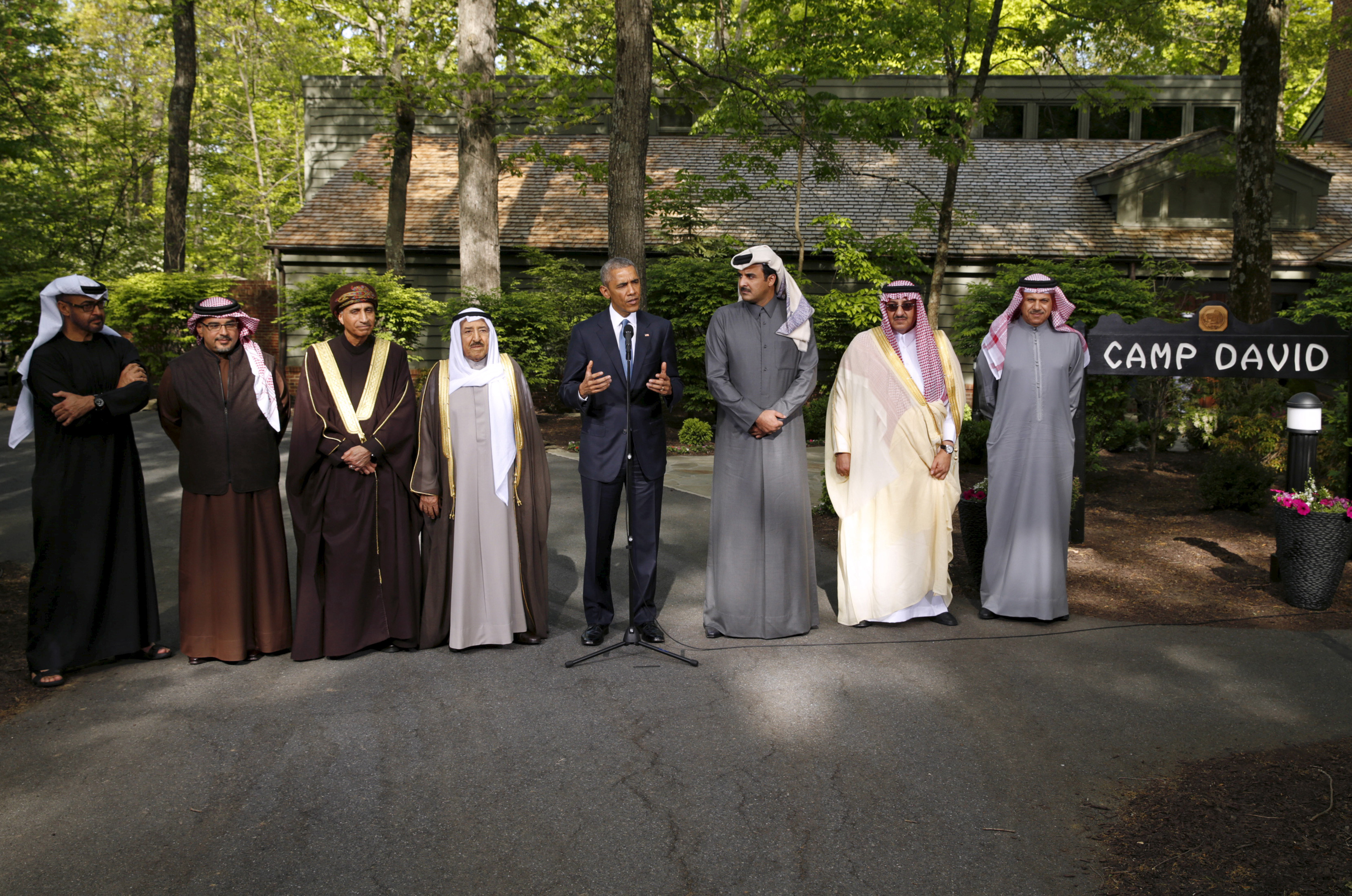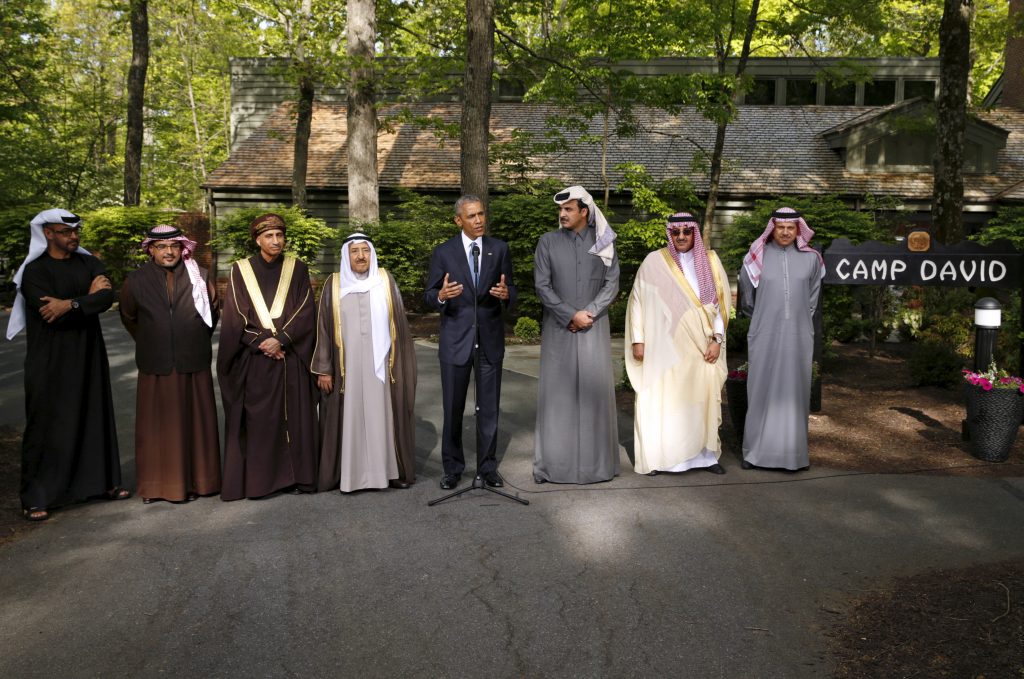 Officials of the six-nation Gulf Cooperation Council (GCC), wrapping up a May 14 summit at Camp David, endorsed US President Barack Obama’s proposed nuclear deal with Iran saying a “comprehensive, verifiable” accord is in their security interests.
Officials of the six-nation Gulf Cooperation Council (GCC), wrapping up a May 14 summit at Camp David, endorsed US President Barack Obama’s proposed nuclear deal with Iran saying a “comprehensive, verifiable” accord is in their security interests.
But in reality, the much-publicized gathering turned out to be “much ado about very little”—and Gulf states are actually deeply disappointed—said Dov Zakheim, Senior Fellow at CNA Corp. and a former US Undersecretary of Defense in the George W. Bush administration.
“Clearly there’s tremendous unease in the Gulf, and there has been for sometime, about Iran and just where the US intends to go, beyond the nuclear agreement,” said Zakheim. “I’ve been dealing with the Gulf for about 25 years, and I have never seen Gulf leaders as anxious and as nervous as they are today.”
Zakheim spoke on a May 15 conference call with Mishaal Al Gergawi, Managing Director of the Delma Institute in Abu Dhabi. The call was organized by the Atlantic Council’s Brent Scowcroft Center on International Security and moderated by the center’s Vice President and Director, Barry Pavel.
The Camp David summit, which followed a White House dinner the night before, involved ten hours of talks between Obama and his Arab guests. At the end, they issued a joint communiqué and agreed to meet again in 2016.
“I believe that the Camp David commitments I have described today could mark the beginning of a new era of cooperation between our countries, a closer, stronger partnership that advances our mutual security for decades to come,” Obama said. “But I want to be very clear: The purpose of any strategic cooperation is not to perpetuate any long-term confrontation with Iran, or to even marginalize Iran.”
Four of the GCC’s six heads of state, including King Salman of Saudi Arabia and the leaders of Bahrain, Oman, and the United Arab Emirates, stayed away from Camp David. Only Kuwait’s Emir Sabah al-Ahmad al-Jaber al-Sabah and Qatar’s Emir Sheikh Tamim Bin Hamad al-Thani showed up.
To be fair, said Al Gergawi, “the President of the UAE is really unwell and it would have been very difficult for him to make the trip. I don’t think he can leave the UAE.”
Even so, he said the view from Abu Dhabi is pessimistic.
“It seems the Obama administration only respects people who play hard, not people who play by the rules. We’ve played by the rules, so what’s the message here? This is really dangerous. Everybody’s watching now what the US is doing with the Gulf countries. For the Gulf, all options are on the table at this point. And if the US says ‘no, you can’t do that,’ the question is, why not?”
Al Gergawi said the Gulf states came to the summit with very low expectations. Rather than discussing the root causes of the region’s frustrations regarding Iran, the White House attempted to placate Gulf leaders with missile defense systems and ballistics.
“I think we’re stuck between two options, and we’re choosing something in-between that’s not helping either side. It’s a slow integration of Iran, a subtle back-door thing where at some point Iran will now be calling the shots on a whole host of issues,” he said. “What we would have wanted is more leadership from the administration, and not ignore what’s happening in Syria, Lebanon, Yemen, and Iraq. There has been a clinical division between carrot and stick, and a lack of imagination. What we’re really seeing are tactics, tactics, tactics.”
Zakheim, noting that both Israelis and the Gulf states fear a nuclear-armed Iran, said that unlike in the past, “there hasn’t been a peep out of Israel” regarding US weapons sales to the oil-rich Arab sheikhdoms and emirates of the Gulf.
That, he suggested, is because Israel doesn’t fear an attack by the Saudis or Kuwaitis, and possesses the military might to defend itself against an Iranian nuclear strike.
“But for the Gulf, the worry is that the Iranians are already disrupting life in four countries—and if they get additional resources as a result of the lifting of sanctions and unfreezing of funds, then they’re not going to use that money to improve the lives of their citizens, but to continue to disrupt life in the Gulf,” said Zakheim.
“The real issue is, would the US intervene if there were trouble in Saudi Arabia’s Eastern Province, or riots in Bahrain?” he asked. “It’s not obvious to me just what exactly our friends in the Gulf got out of this agreement.”
Al Gergawi said “the whole Iran nuclear deal reeks of mistrust and secrecy”—which is why Gulf Arabs were uneasy about the talks to begin with. Details of the agreement are vague, and GCC member states have been kept in the dark, he claimed.
“If we just give Iran a nuclear green light, then what are we doing? Iran won’t have a need to behave,” he said. “The reality of the matter is the Obama administration has no imagination on what Iran will do. We’re next to Iran. You guys are in a different continent. If they have to reassure us that much that they’re not trying to throw us under the bus, it means they’re not sure.”
Zakheim said that from the White House’s perspective, it’s not only about leaving a positive legacy in the Middle East—but a desire to exit the region completely.
“I think this administration wants to get the heck out of the Middle East, and to do that, it needs to have an accommodation with Iran,” he said.
“You can see signs of it already. One is a downgrading of the [US] relationship with Israel. The Israelis are no longer as important as they were,” he continued. “I would argue pretty much the same with the Gulf if there’s a deal with Iran. To me, that’s a totally flawed approach because the Iranians don’t show any intention of changing their behavior.”
Larry Luxner is an editor at the Atlantic Council.
Image: US President Barack Obama hosted leaders and officials from the six-nation Gulf Cooperation Council (GCC) at Camp David in Maryland May 14. From left are the United Arab Emirates' Crown Prince, Sheikh Mohammed bin Zayed al-Nahyan; Bahrain's Crown Prince, Salman bin Hamad Al-Khalifa; Oman's Deputy Prime Minister, Sayyid Fahd bin Mahmoud Al Said; the Emir of Kuwait Sheikh Sabah al-Ahmed al-Jaber al-Sabah; the Emir of Qatar Sheikh Tamim bin Hamad al Thani; Saudi Arabia's Crown Prince, Mohammed bin Nayef; and the Secretary General of the GCC, Abdul Latif bin Rashid Al Zayani. (Reuters/Kevin Lamarque)
